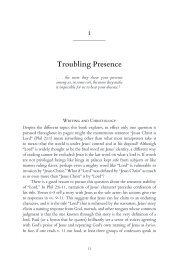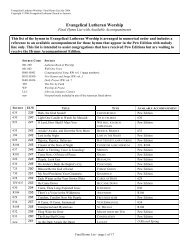19. Pastoral Letters: 1 Timothy, 2 Timothy, Titus - Augsburg Fortress
19. Pastoral Letters: 1 Timothy, 2 Timothy, Titus - Augsburg Fortress
19. Pastoral Letters: 1 Timothy, 2 Timothy, Titus - Augsburg Fortress
Create successful ePaper yourself
Turn your PDF publications into a flip-book with our unique Google optimized e-Paper software.
Copyrighted Material<br />
1 <strong>Augsburg</strong> timothy, <strong>Fortress</strong> 2 timothy, Publishers titus 447<br />
tudes that are appropriate, if somewhat bland, for older men (2:2) and women (2:3),<br />
younger women (2:4-5) and men (2:6), followed by an exhortation to slaves (2:9-10).<br />
In 3:1-2, general civic attitudes of submission to authority and basic rules of civility are<br />
recommended. All of these can be summed up as the doing of good works (kala erga;<br />
2:14; 3:8, 14) that express the new Christian identity, in contrast to the wicked deeds<br />
of the opponents (1:16).<br />
A closer look at the specific instructions raises some interesting questions. Why<br />
should older women need to be told not to be winebibbers (2:3)? Do their daughters<br />
really require teaching to “love their husbands and children” (2:4)? Are Christian slaves<br />
in need of instruction not to pilfer their masters’ goods and not to be stubborn and<br />
untrustworthy (2:9-10)? Do Christians generally need to be told to seek “honest work”<br />
and that they should not be revolutionary (3:1-2)? The problem is this: behavior this<br />
ordinary should fall into the category of “what goes without saying,” but here we find<br />
basic instructions being given in civility, the rudiments of civilized behavior. Since, as<br />
we have seen, “households” are being overturned by the success of the Jewish missionaries,<br />
these instructions are intended—in response—to strengthen the basic familial<br />
unit of the community by implicitly contrasting Christian behavior with that of the<br />
opponents: the opponents represent the opposite of the civility that ought to be found<br />
among members of the Christian household. Through this type of insider-outsider<br />
distinction, the gospel teaching is given a framework in which it might be able to grow<br />
securely, closing off the opportunity for further damage by the opponents. In <strong>Titus</strong>,<br />
therefore, the gospel itself takes on a civilizing function: it teaches people how to be<br />
members of society, a nuance often disguised by the English translation of the Greek.<br />
In this light, we can better understand the two remarkable kerygmatic statements<br />
in <strong>Titus</strong> in which the Pauline language is most pronounced. These statements, we<br />
should note, frame and interpret the concrete directives. In 3:3-7, the author quotes a<br />
“faithful saying” that takes the form of a before-and-after statement, with the pivotal<br />
point being people’s baptism as a response to the “good news.” Before, they had shared<br />
in all the hostile attitudes of their neighbors, passing their days in malice and envy,<br />
“hated by people and hating one another” (3:3). But they had been given a new identity<br />
(3:4-7):<br />
But when the goodness and loving kindness of God our Savior appeared, he<br />
saved us, not because of deeds done by us in righteousness, but in virtue of his<br />
own mercy, by the washing of regeneration and renewal in the Holy Spirit,<br />
which he poured out upon us richly through Jesus Christ our Savior, so that<br />
we might be justified by his grace and become heirs in hope of eternal life.<br />
Here we see that the qualities of God’s gift—the goodness and kindness and<br />
mercy—should themselves shape Christian identity, both renewing and regenerating<br />
it. This statement is followed by the final command, “Insist on these things, that those




